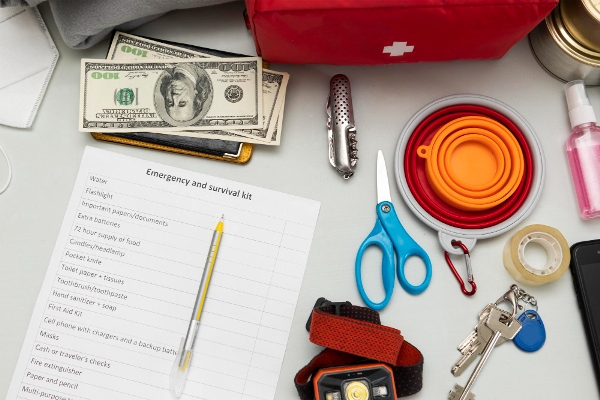Many people were left devastated in the wake of Hurricane Ian that recently slammed into the southwestern coast of Florida. Although it will take time to assess the full extent of damage caused by Hurricane Ian, much of the wreckage is already apparent. Hurricanes are one of the most costly and dangerous natural disasters. These formidable forces of nature account for millions of dollars in property damage and countless injuries and even deaths in the United States. Some regions of the U.S. experience multiple hurricanes and tropical storms annually. Here are some crucial tips and recommendations to help you prepare for a hurricane.
Put Together an Emergency Kit
You should make two emergency kits, one for your vehicle and the other for your home. Stock up on all the essential items before the hurricane approaches. You do not want to attempt to go to the store once the hurricane touches down. A good emergency kit will have power sources, food and water, and medical supplies.
Hurricanes can easily cut off your power supply, so you should have flashlights and headlamps handy. Also, do not forget to pack extra batteries because you won’t know how long or how often you will use your power sources.
In addition to power sources, your emergency kit should contain essential medical supplies. Many people suffer cuts, lacerations, and abrasions in a hurricane. If you venture outside, you could be hit by a flying object or slip and fall. Include a first-aid kit in your emergency pack, just in case.
Finally, gather plenty of food and water to last you during and after the hurricane. A hurricane can leave you stranded without running water. Access to clean water for drinking, hygiene, and cooking is vital. Furthermore, without power, all the food in your fridge will likely spoil. Non-perishable food like canned products, protein bars, and dried fruit are great choices for your emergency kit.
Create an Emergency Plan
Writing an emergency contact plan can add stability to a chaotic time. It can be challenging to recall emergency service numbers without the internet or as your mind races. Keep a running list of emergency services phone numbers that you may need. Upload all the emergency services numbers to your phone and place multiple physical copies in easily accessible places inside your home.
Furthermore, you should map an evacuation route or a path to your local shelter as part of your plan. Charter several routes because some highways or bridges may close because of the hurricane. Agencies recommend that you note multiple shelters because you should always have a backup. Also, contact out-of-town relatives or friends you can travel to if your town advises you to evacuate. Once you have picked out your locations, inform your family and friends where you intend to stay.
Know the Difference Between a Watch and Warning
Stay up-to-date on National Weather Service advisories through your television, radio, or online. Know that a hurricane watch and a hurricane warning are different. A hurricane watch means that hurricane conditions are only possible in your area. Meanwhile, a hurricane warning means that weather services expect the hurricane to occur in the area.
Prepare Your Vehicle and Home
Whether evacuating or sheltering in your home, ensure your vehicle and home are ready. Be certain that you have a full tank of gas and an extra emergency kit inside your vehicle. Also, move your car into an enclosed area, like your garage. If you leave your car exposed to the elements it can be swept away or damaged by flying debris.
Wind speeds can reach a staggering 150 mph in a Category 4 hurricane. These winds can tear through a town with unimaginable power. You should never underestimate the strength of a hurricane. To safeguard your home you should:
- Move anything that can blow around during the storm inside. This applies to outdoor furniture, bikes, lawn decorations, and barbeques.
- Put up storm shutters or plywood to cover your windows. This will prevent them from shattering.
- Make sure your carbon monoxide detector is operational.
- Know when to turn off your power. You may need to do this if your house floods or a power line falls near your home.

